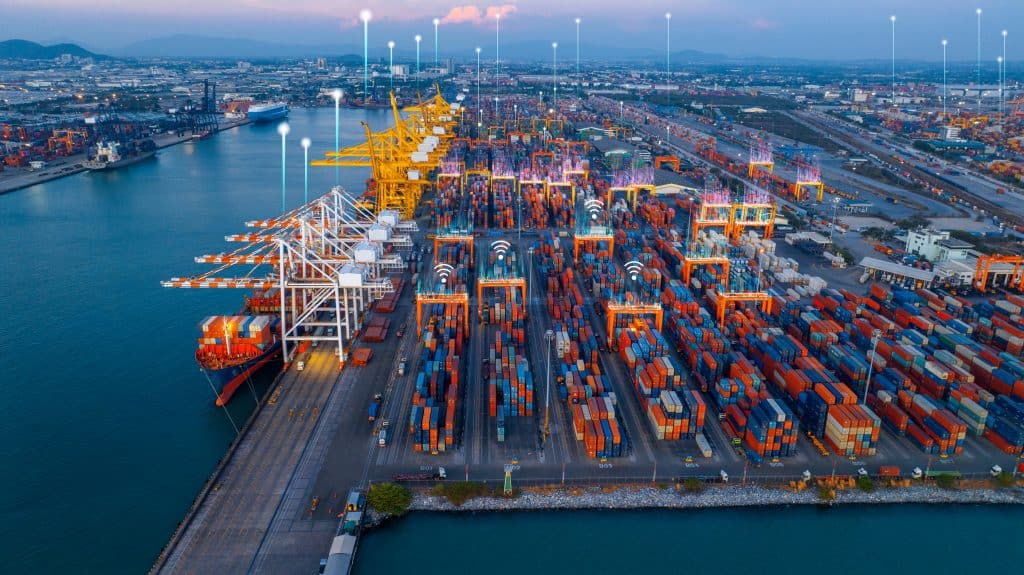What is an intelligent port?
An intelligent port is a port infrastructure that has been modernized through the use of technologies such as AI and IoT (Internet of Things) to ensure container traceability and optimized movement. These technologies aim to support workers, improve their safety (thanks to the docker emergency stop button, for example) and the performance of operations, and initiate more environmentally-friendly approaches.
Optimizing operational efficiency
Intelligent ports guarantee fluid flow management, better coordination between all parties involved, and real-time supervision. This improves logistics planning and reduces human error.
Reducing costs
Task automation, predictive maintenance and rationalized travel all help to reduce operating costs and greenhouse gases. Large-scale data analysis also enables better resource allocation.
Enhancing safety
Ports are critical environments. Thanks to connected devices, alerts can be sent to the dispatcher in real time. This enhances staff safety. For example, a control station can be alerted at the touch of a button, ensuring fast, reliable and efficient critical communication (docker emergency stop button).
Meeting environmental challenges
The growth of Big Data and good connectivity make it possible to optimize movements, extend the life of equipment, monitor energy consumption, automate adjustments... Ports can reduce their carbon footprint thanks to this connected management of operations.
Barriers to modernization
Extensive and complex sites
Ports are highly heterogeneous environments. They mix different indoor and outdoor zones (quayside, docking area, storage area, offices, industrial zone...). Providing reliable, uninterrupted telecom coverage can be a real challenge.
The consequences are immediate: signal interruptions, white zones, difficulties in maintaining connection throughout the site. The slightest interruption can be problematic in critical situations. Unstable connectivity reduces efficiency and can constitute a security risk.
Increased demands on cybersecurity...
Digitization implies a multiplication in the volume of data processed, which can be sensitive. This information must circulate without interruption, while being isolated and protected from intrusion.
Interconnected systems increase the attack surface. Ports must therefore rely on solutions where every access is controlled, with authenticated users.
... and in performance
Digitizing a port means ensuring that new technologies remain 100% available, whatever the circumstances. A network outage can block equipment, interrupt an operation, or delay a critical alert.
Some equipment is constantly moving from one area to another, and the network must be able to keep up with them without losing the connection. Other applications are very demanding in terms of connection and bandwidth, such as the use of multiple cameras with very high-definition video.
If the network isn't up to scratch, these technologies become risky.
The mobile network (RMP) as a transformation lever for ports
To overcome the limitations of traditional networks, ports can equip themselves with a private mobile network. This is based on 4G/5G and uses reserved frequencies, allocated in France by ARCEP.
The RMP offers stable, continuous and controlled connectivity, designed for critical environments such as ports. It is capable of covering large indoor and outdoor areas, including complex or isolated zones.
Private mobile networks are custom-built to meet the specific needs of each site: supervision, fluid movement, management of connected objects, prioritization of critical flows, 4k video... Thanks to its high performance (low latency, high throughput, coverage), everything is in place to meet critical challenges and ensure competitiveness and security.
Use cases in intelligent ports
The connectivity offered by private mobile networks paves the way for new, high value-added uses, which are becoming essential for gaining a competitive edge:
Team communication and safety
Agents can be equipped with terminals incorporating an emergency call button and fall detection sensors. In the event of an incident, an emergency call is transmitted directly to the dispatcher. Preemption ensures that this call is given priority.
Equipment automation
The RMP connects cranes, forklifts and industrial equipment to facilitate the transport of goods and increase efficiency throughout the port.
Intelligent video surveillance
Wireless cameras can be deployed easily, without the need for civil engineering. Coupled withAI, they can automatically detect suspicious behavior or high-risk situations and immediately alert the appropriate teams to intervene.
Logistics supervision
The integration of IoT sensors and chips enables goods to be tracked. Movements, temperatures, humidity, handling history... This data is fed back to improve resource management.
Equipment maintenance
Thanks toIoT and data analysis, smart ports can continuously monitor the status of their equipment. This monitoring provides a remote view of equipment status, enabling failures to be predicted before they occur, and interventions to be planned if necessary. In this way, RMP reduces downtime and maintenance costs.
TDF, RMP expert for ports and critical environments
Port modernization is becoming a necessity to meet performance and safety requirements. Connectivity is the cornerstone.
As a specialist in connectivity infrastructures, TDF supports ports in their transformation. Our team designs, deploys and operates private mobile networks tailored to the requirements of sensitive industrial sites such as ports. TDF offers a tailor-made solution, designed to guarantee security, availability and performance.
From radio studies to network deployment and operation, TDF's teams are with you every step of the way. Would you like to find out more? Please contact us.

